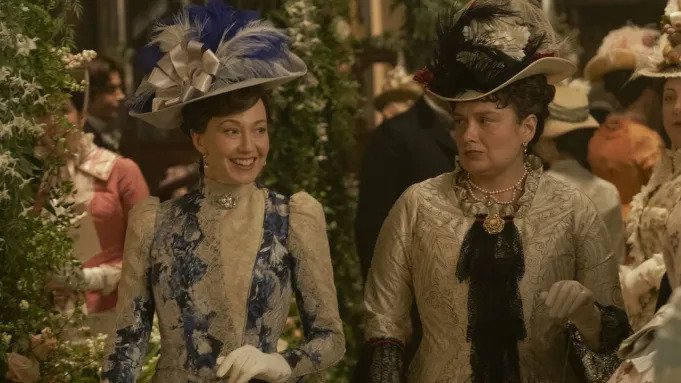For the most part, HBO’s The Gilded Age has made do without much in the way of a major antagonist. Sure, there were some minor antagonists here and there, like Armstrong with her flat, textureless racism or Maude Beaton with her scamming away all of Oscar’s money. There have been only two characters that stood as season-long antagonists: Caroline Astor, who futilely fought to keep the Academy of Music as the music hall for New York’s richest folk, and Turner, the upjumped ladies’ maid who failed in her parched, desperate attempt to seduce George Russell and couldn’t secure the connections she so wanted with the Duke of Buckingham.
Neither woman, for all their wiles and ambition, could see their plans through to success because they had the misfortune of picking the wrong opponent. Bertha Russell, as glamorous as she is maniacal, defeated each enemy she had with barely a bend of her steel-rod spine. For two seasons, The Gilded Age portrayed Bertha as something of an anti-hero. This relative underdog would do anything in her power to break into New York high society, and now Bertha has done it — she’s pulled off the wedding of the century and made herself an undeniable member of New York’s ruling class. All she had to do was embrace her truest, villainous self.
It’s not that this turn is a surprise, exactly. Along with her robber baron husband, George, Bertha has acted as a supervillain since the very first season. Early episodes established her as a social-climbing Terminator who would stop at nothing to be recognized in high society. Even as she went to extremes like sequestering Gladys away for so long, Bertha’s antagonism felt more archetypal than real. There’s a scene in which Bertha reads a newspaper article about an event she was snubbed out of being invited to. Her eyes narrow and go hard before she swipes the breakfast tray from her lap onto the floor. This kind of farcical, campy villainy felt more fitting for the kind of show The Gilded Age was before. Nothing felt substantial or impactful because the series coasted on vibes and vaguely plot-shaped movements. Bertha was a villain, but more in the nominative sense. This began to take a turn towards the end of the second season when Bertha set her sights on the Duke of Buckingham and planned to marry him to her daughter Gladys. The move felt entirely on-brand, but going through with it seemed like a thornier thing than The Gilded Age was prepared to do.
In the episode “Marriage is a Gamble,” Bertha crosses the event horizon and becomes The Gilded Age’s first real big bad. The wedding of Gladys and Hector, Duke of Buckingham, is a culmination of Bertha’s painstaking scheming and planning. She micromanages every aspect, possibly even more intensely once her sister Monica (Merritt Wever!) appears. The plain-spoken, old-fashioned Monica with her doily dresses is an excellent foil to the tightly-wound, elegant Bertha. Monica also represents Bertha’s much humbler past, a chapter she’s otherwise hidden from her high-society set. How evil is Bertha willing to be so that this wedding goes off without a hitch? Evil enough to conspire for a coffee cup to break and ruin Monica’s dress so that she has to change into a more Bertha-approved gown. She also barely acknowledges Monica, not even bothering to introduce her to anyone.
To Bertha, it’s beside the point that Gladys emphatically does not want to marry the Duke. The feat of marrying into the English gentry is too big for Bertha to resist. Bertha has claimed that this is really about Gladys, about providing her with the best possible seat of power marriage can buy. Bertha may genuinely believe this, but it’s clear she sees the wedding as ultimately her accomplishment, her coup. Notably, Bertha’s machinations are never framed as tough love or ultimately justified. Whether Gladys wants it, would find happiness in it, or use her power for good are all immaterial to Bertha. What’s important is that she came from outside the ruling class and, inside three years, got her daughter a duchy. Even Mrs. Astor, Bertha’s sworn enemy, remarks that it’s an unbeatable achievement of Bertha’s. Bertha gets the vicarious glory, and Gladys remains a pawn.
In its former form, The Gilded Age might not have handled this turn quite so successfully, but the series continues its competence streak. Bertha’s antics wouldn’t feel so villainous if the show weren’t giving the plotline more emotional weight. Gladys is still an underused character, but the series gave her depth of feeling that wasn’t there before. It gave the story stakes, and that’s what was lacking in a lot of the storytelling on The Gilded Age. Later in the episode, old nemesis Turner whispers with Mrs. Fish about digging up dirt on Bertha by getting to know Monica. It’s not blowing anyone’s mind, but it’s another sign that the show is evolving when The Gilded Age is setting up the next conflict this smoothly. If George’s distaste for how the wedding came together is any indication, there may be trouble in Bertha’s marriage as well. Allowing Bertha to flower as the big bad sets up plenty of tension for the rest of the season. It would be poetic to see Bertha’s downfall come from her greatest triumph, and The Gilded Age might finally be strong enough to tell that story.


